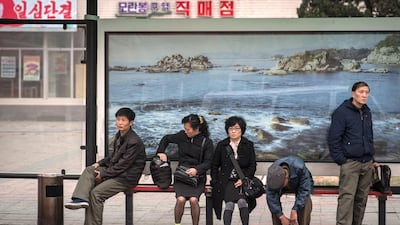Life in North Korea is often described as brutal, a never-ending hardship. But for the citizens of that closed, isolated nation, they are taught it is anything but.
Bombarded with images of starving children in Africa, the regime has hammered home the message that its citizens are the fortunate ones – all part of its stranglehold on their lives.
Ji Ok-hee, a 52-year-old North Korean, fled 14 years ago.
Initially enjoying a privileged career, she described a dramatic drop in living standards.
“After school, every North Korean either joined the military, went to university or was employed by a state-owned company,” she said, speaking to The National in Seoul.
“I chose to join the military because being a member of the labour party is one of the best things a North Korean can do. I served five years then was discharged and became a community leader.”
After the death of Kim Il-sung, the grandfather of current leader Kim Jong-un, daily life deteriorated quickly.
“We would get food on a regular basis before, but then we got only grains instead of rice and people were dying of hunger on the streets,” Ms Ji said.
“We were brainwashed to think North Korea was paradise. We were shown pictures of children dying from famine in Africa.”
Her children would often remain unfed for three days at a time, which pushed her to flee to China.
_____________
Read more on The National's Korea series
Korean president: 'I look forward to taking our strategic partnership to new heights'
Korea and UAE will be century-long partners, says ambassador
Emirati tells of 'outstanding' medical treatment following transplant in South Korea
_____________
Crossing the North Korea-Chinese border was not always an easy feat, because the Tuman River freezes in winter. “I didn’t have enough money to bribe the border guards so I would hide in the snow and either swim or walk across the river,” she said. “My friend died from a river swirl and another time my feet stuck to the ice. I had to suffer in silence to avoid getting caught.”
Her husband had died at his parents’ because of hepatitis – a loss she discovered only six months later because letter exchanges were the only means of communication and his parents lived a week’s journey from her hometown.
“I never thought I’d defect to South Korea, but to China,” Ms Ji said. “We were told even dogs in China had food.”
After working on a farm in the Yanbian prefecture in China’s Jilin province in January 2002 sowing tobacco seeds and growing crops, she was paid with a bag of snacks.
That pushed her to take her nine-year-old son, 13-year-old daughter and mother away from North Korea.
“We stayed for a month in a North Korean church which helps defectors in China,” she said. “We were well fed and given the freedom to cook our food. Life there was a lot better.”
Her illiterate daughter learnt how to read and write Korean through the Bible. But they constantly lived under fear and in hiding from security authorities in neighbouring countries.
“I had to cross borders walking for eight hours at a time barefoot with my mum on my back because she was paralysed from the waist down,” she said. “I lost all my toenails and the rough terrain left dirt marks on my feet for a month. The whole procedure was so tough.”
When she finally arrived in Seoul, the South Korean government offered her a small apartment for a quarter of the market price.
Scholarships were given only to defectors up to the age of 35, so she had to earn her tuition by studying in the day and working in social welfare at night.
The Korean National Intelligence Service in Seoul questions defectors upon their arrival. They spend months at Hanawon – a settlement support centre where defectors are trained and screened to ensure there is no relapse. They also provide support for defectors to settle in the country with a job-matching service.
Her daughter went on to study psychology at Sogang University, one of the best in South Korea, before working as a government official, while her son majored in social welfare at Soongsil University. “It made me very proud,” Ms Ji said. “I met my second husband a year later and witnessed the pregnancy – for the first time – of my third child. In North Korea, you don’t know you’re pregnant until six months in when your belly expands.”
The couple bought property in the Yangpyeong county from the money they earned. Its value grew five times before they sold it.
“My husband invested in his own business but lost it all to a criminal,” she said. “It was the first time I contemplated suicide – it was a hard-learnt lesson, but I realised that whatever struggle is better than North Korea and that became my inner power.”
She has since taught herself how to use a computer and play the accordion.
“People from my class gave me clothes and cosmetic samples,” she said. “That’s when I realised there are many more good people in this world than there are bad, and that’s worth living for.
“If you think of people richer than you, you will never be happy and I am as happy as can be.”

